Class 10 Exam > Class 10 Notes > History for GCSE/IGCSE > Did the First World War Weaken the Tsar?
Did the First World War Weaken the Tsar? | History for GCSE/IGCSE - Class 10 PDF Download
How did the First World War Lead to the Collapse of Tsarist Russia? - Timeline & Summary
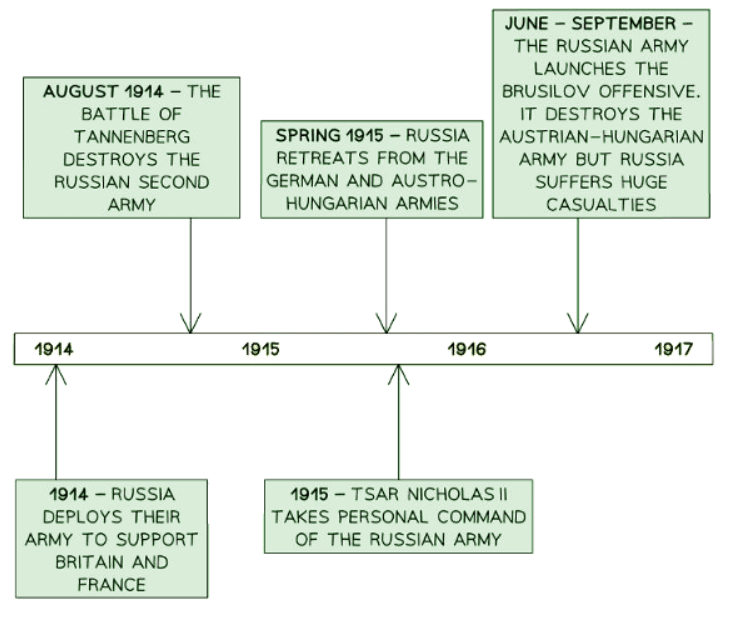
- In 1913, Tsar Nicholas II's position looked secure. He had survived the 1905 Revolution and continued using repressive measures against his people. The Russian economy had improved. 1913 was also significant as Nicholas celebrated the tercentenary of the Romanov dynasty. Millions across the Empire celebrated the event, and Nicholas stated, "my people love me." However, within four years, Tsarist Russia would no longer exist.
- Some historians argue that the First World War played a significant role in the end of Tsarist Russia. The war, which relied on twentieth-century technology, exposed Russia's economic backwardness. The empire was unprepared for war. It is estimated that 800,000 men in the Russian Army did not have rifles. Russian factories could only produce 13,000 rounds of bullets a day. By 1916, over 1.7 million Russians had died in the conflict. Millions of Russian soldiers, most of them peasants, deserted from the front lines.
- The Home Front of the Russian Empire could not cope with the pressures of war. Food shortages and taxes caused anger and strikes. The tsar did not manage the crisis effectively. In 1915, he had placed the army under his personal command. This created a power vacuum in Petrograd that allowed more strikes to occur. By 1917, the Russian Army was failing, and the Russian Empire was close to collapse.
- The conflict also brought shame to the Romanovs. Tsarina Alexandra was German, and many people began to dislike the German influence on Russia. This sentiment became so extreme that Nicholas renamed St Petersburg, which had Germanic roots, to Petrograd in 1914. However, the actions of the Tsarina disgusted the aristocrats and turned more people against tsarism.
Military Defeats and Desertion
- The Russian Empire enthusiastically entered the First World War, mobilizing an army of 5.3 million people in ten days with high patriotism.
- Russia's initial military campaigns faced failure.

- By 1915, the German Army had deployed soldiers in Poland, Lithuania, and Latvia which were territories formerly part of the Russian Empire.
The Brusilov Offensive
- In 1916, significant enhancements were made to the Russian war effort, including improved military supplies to the Eastern Front.
- General Brusilov, a skilled military leader, was appointed by the tsar to strategize a counter-offensive.
- Brusilov initiated a major attack on the Austro-Hungarian Army in June 1916, marking the largest Russian assault during World War I.
- The Brusilov Offensive, although initially successful, resulted in lasting detrimental effects on the Russian Empire.

Desertion
- The Russian Army faced a significant challenge with desertion as a considerable number of conscripted peasants comprised its ranks. These soldiers lacked proper training and were ill-prepared for warfare.
- By 1916, the issue of desertion escalated drastically, leading to a substantial increase in the number of deserters. Historians approximate that around one million soldiers deserted the Russian Army by 1917.
How did Russia's military campaign impact Tsarist Russia?
- Tsar Nicholas assumed direct control of the Russian Army in 1915, despite lacking military expertise.
- The populace could attribute Russia's military failures to the tsar's leadership.
Nicholas's Lack of Military Experience:
- The tsar's lack of military background hindered his ability to effectively lead the Russian Army.
Impact of Defeats on Public Morale:
- Failures in battles significantly dampened the morale of the Russian population.
- Initially, many Russians supported the war efforts in 1914.
- However, escalating casualties began to turn public sentiment against the war.
- The brunt of the war's consequences fell disproportionately on peasants compared to other social classes.
Economic Impacts
- Russia's Economy Impact By 1914:
- Russia improved its economy significantly.
- It possessed the largest gold reserve in Europe.
- Russia stood as the fourth-largest economy globally.
- First World War Consequences:
- The war shattered Russia's economic stability.
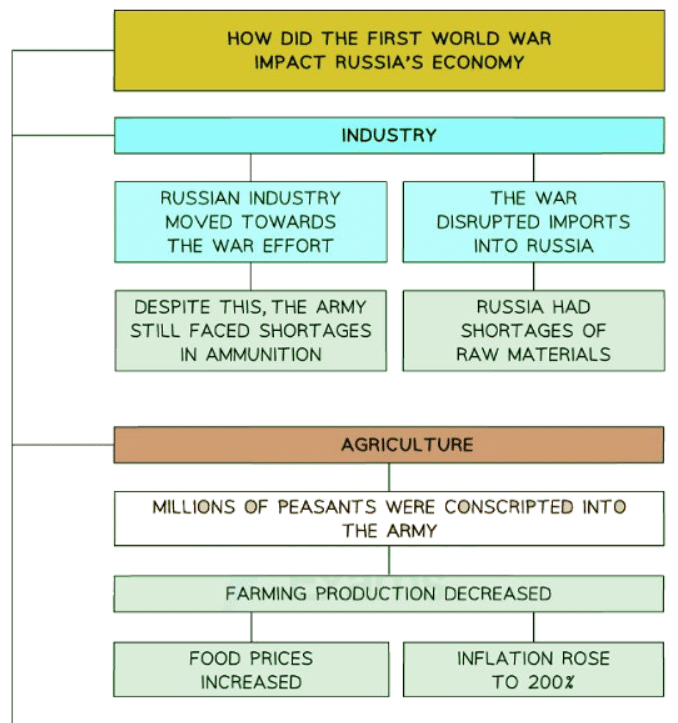
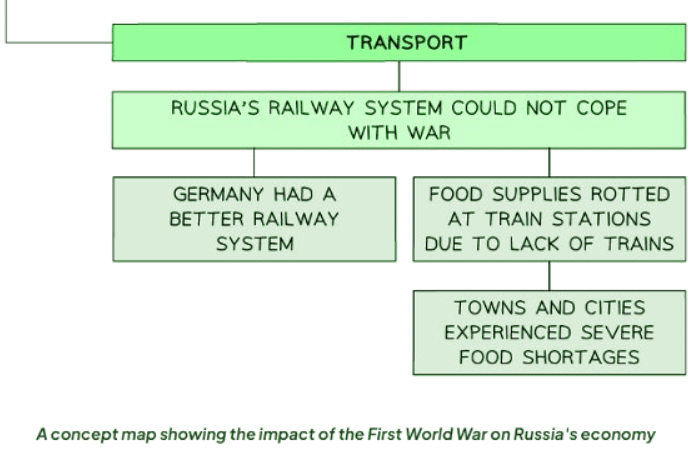
How Did the Economy in the First World War Impact Tsarist Russia?
- Inflation's Effects:
- Real wages of workers declined due to inflation.
- Many workers faced challenges affording food, leading to food riots.
- Social Unrest:
- Unemployment surged, triggering over 1,300 strikes by 1917 in support of the impoverished and jobless.
- The government neglected widows, orphans, and those entitled to war-related pensions.
Rasputin and the Governing of Russia
- Tsar Nicholas II and Tsarina Alexandra had five children. They only had one son named Alexei.
- Alexei suffered from hemophilia, a medical condition that was kept secret from the Russian people.
- Nicholas was concerned that Alexei's illness would make him appear weak as he was the heir to the throne.
- Due to Alexei's condition, Rasputin became increasingly important but also harmful to the Romanov family.
Who was Rasputin?
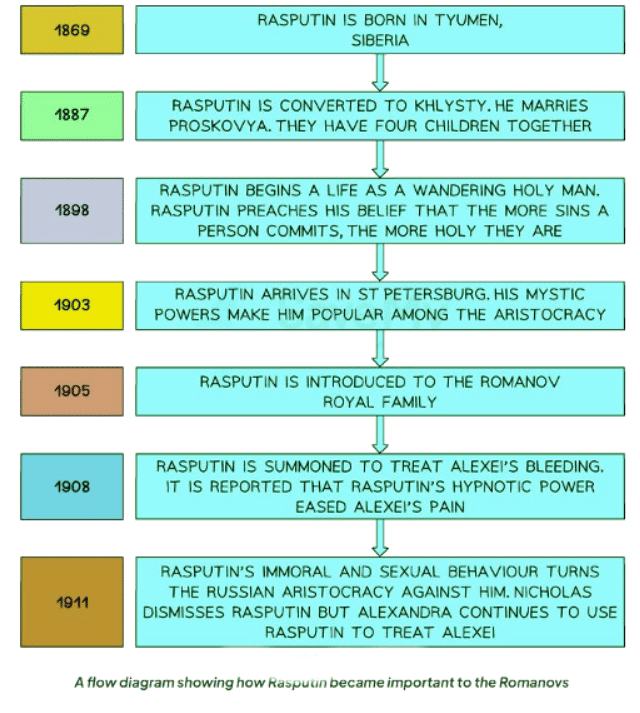
How did Rasputin impact Tsarist Russia?
- When Nicholas took personal command of the Russian Army, he left Alexandra in charge of Russia.
- Alexandra relied on Rasputin as her adviser.
- This government made poor decisions and dismissed many ministers.
- Alexandra relied on Rasputin as her adviser.
- Alexandra's association with Rasputin damaged her reputation.
- Many people believed the false rumor that Rasputin was Alexandra's lover.
- Opponents like the Bolsheviks used this as propaganda to turn people against Tsarism.
- Historians believe that this rumor is untrue.
- Many people believed the false rumor that Rasputin was Alexandra's lover.
- The tsarist government lost the support of key 'pillars' of Russia.
- The Orthodox Church reduced its support for the tsar due to Rasputin.
- Rasputin's religious practices conflicted with Russian Orthodoxy.
- Russian aristocrats murdered Rasputin in December 1916.
- The Orthodox Church reduced its support for the tsar due to Rasputin.
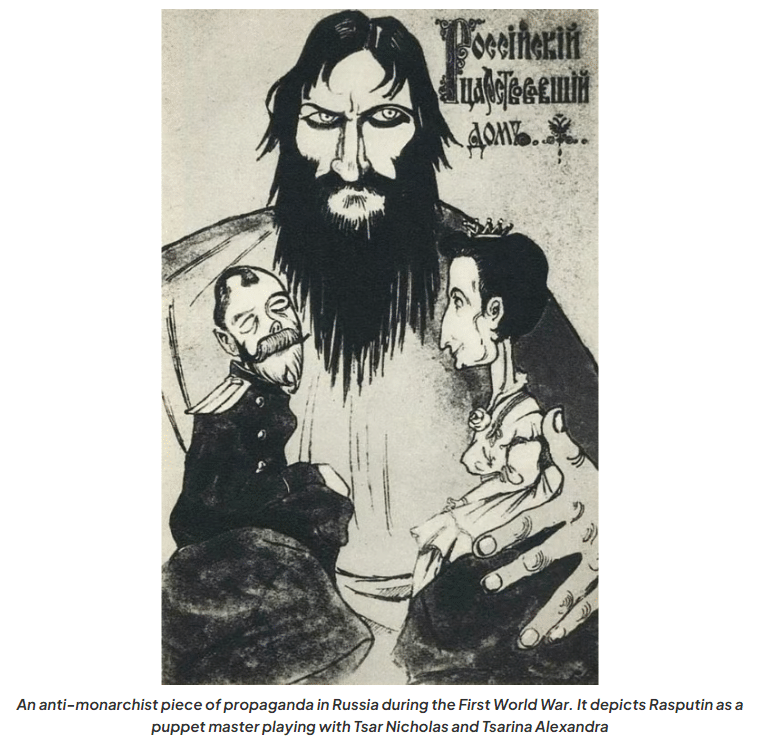
Question for Did the First World War Weaken the Tsar?Try yourself: How did the First World War impact Tsarist Russia?View Solution
The document Did the First World War Weaken the Tsar? | History for GCSE/IGCSE - Class 10 is a part of the Class 10 Course History for GCSE/IGCSE.
All you need of Class 10 at this link: Class 10
|
79 videos|87 docs|18 tests
|
FAQs on Did the First World War Weaken the Tsar? - History for GCSE/IGCSE - Class 10
| 1. How did military defeats and desertion contribute to the collapse of Tsarist Russia during the First World War? |  |
Ans. Military defeats and desertion during the First World War severely weakened the Tsarist regime as the Russian army suffered significant losses on the battlefield, leading to a lack of morale and trust in the government. Desertion further depleted the army's ranks and eroded support for the Tsar among the population.
| 2. What role did economic impacts play in the collapse of Tsarist Russia during the First World War? |  |
Ans. The economic impacts of the First World War, such as inflation, food shortages, and increased taxes, put a strain on the Russian economy and further exacerbated social unrest. This economic hardship contributed to the dissatisfaction with the Tsarist government and ultimately led to its collapse.
| 3. How did Rasputin's influence on the governing of Russia contribute to the downfall of Tsarist Russia during the First World War? |  |
Ans. Rasputin's controversial influence over Tsarina Alexandra and his perceived corruption and debauchery weakened the Tsarist regime's credibility and legitimacy in the eyes of the Russian people. This further fueled opposition to the Tsar and played a role in the collapse of the monarchy.
| 4. Did the First World War weaken the Tsar's power and authority in Russia? |  |
Ans. Yes, the First World War significantly weakened the Tsar's power and authority in Russia as the military defeats, economic hardships, and internal unrest eroded support for the monarchy. The Tsar's inability to effectively manage the war effort and address the needs of the population further undermined his rule.
| 5. How did the collapse of Tsarist Russia during the First World War impact the course of Russian history? |  |
Ans. The collapse of Tsarist Russia during the First World War paved the way for the Russian Revolution of 1917, which ultimately led to the establishment of the Soviet Union. The events of the war and the resulting collapse of the monarchy reshaped the political landscape of Russia and had far-reaching consequences for its future development.
Related Searches




















